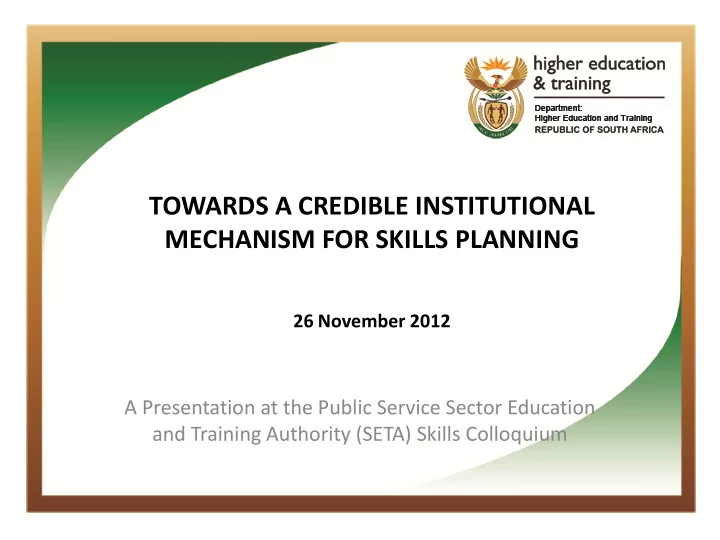

TOWARDS A CREDIBLE INSTITUTIONAL MECHANISM FOR SKILLS PLANNING 26 November 2012 A Presentation at the Public Service Sector Education and Training Authority (SETA) Skills Colloquium
Presentation Outline • Background • Objectives • 6 Research Themes and a Cross-cutting Capacity Building Component • Governance Structures
BACKGROUND • A research project in support of Delivery Agreement 1: Outcome 5.1 Towards a Credible Institutional Mechanism for Skills Planning • HSRC approached DHET with proposal to undertake research project: Labour Market Intelligence Project (LMIP) • Workshop held in August 2011 with DHET to discuss research needs • Memorandum of Agreement signed with HSRC (Feb 2012) and Wits Education Policy Unit (EPU) (Dec 2011) • Research Agenda Setting Workshop held in Irene in May 2012, at which conceptual underpinnings of research project were presented and discussed
GOAL Support DHET to establish a credible institutional mechanism for skills planning, the main components of which are: - 5.1.1: develop standardised frameworks for the assessment of skills supply, shortages, and vacancies in the country - 5.1.2: Develop mechanisms to interface operating systems - 5.1.3: Develop strategic management information systems
THEMES Theme 1: Labour market analysis frameworks, information systems Theme 2: Skills forecasting - The supply and demand model (Wits EPU) Theme 3: Studies of selected priority sectors Theme 4: Reconfiguring the post school sector Theme 5: Pathways through education and training and into the workplace Theme 6: Understanding changing artisanal milieus and identities Theme 7: Capacity Building
Theme 1: Establishing a Foundation for Labour Market Information Systems in SA • Indicator system • Integration of data systems • Data curation • Research: application & incentivisation of management information systems • Coordinating frameworks for organising & managing labour market intelligence • Research website
Theme 2-Skills Forecasting: A Supply & Demand Model • Project of the Wits Education Policy Unit • Linked Macro-Education Model for South Africa • Predict the demand for labour in 45 sectors of the economy • Incorporates education modules • Regular forecasts of the supply and demand for skills
Theme 3: Studies of Selected Priority Sectors • Skills-Biased Employment Demand – An Empirical Overview • Growth, Employment, and Skills: The New Growth Path Revisited • SETA Labour Markets: A Primer for SETA Performance Improvement – Develop a generic SETA labour market survey (to ensure the generation of quality data on the basis of which to develop/inform Workplace Skills Plans (WSPs), Sector Skills Plans (SSPs), and Annual Training Reports (ATRs)) • Employment Creation through the Informal Sector
Theme 4: Reconfiguring the Post-Schooling Sector 1. A Study in Labour Market Interactive Capabilities, Structures, and Mechanisms in the PSET sector – NB: The role of, interaction with, and location of SETAs 2. Institutional Responsiveness and Student Employability in Vocational Education and Training Curriculum 3. Role, Nature, Scope, and Effectiveness of Adult Education and Training (AET) in South Africa – ??? Reconfiguration in respect of livelihoods and labour market outcomes???
Theme 5: Pathways Through Education and Training and into the Workplace • Longitudinal national youth panel survey • Assess efficiency and effectiveness of young peoples’ transitions through the education system into employment • Identifies barriers in educational outcomes, wrt. the education and training system, and dynamics of labour market and economy • Uses international lessons for implementation and a mechanism for long-term institutionalisation
Theme 6: Understanding Changing Artisanal Occupational Milieus and Identities 1. A Historical Account of Artisanal Skilling and Employment through the Lens of Political Economy 2. A Study of the Shifting Boundaries between Professions and Occupations: Impact on Artisanal Work and Training 3. A Study of the Relation between the Changing Nature of Artisanal Work, Apprenticeships and Trade Testing
Theme 7: Capacity Building • A Student Bursary component • An institutional capacity building programme for the DHET and SETAs • To be marketed nationally and students selected for 2013 and 2014 academic years. • HSRC/NRF sending out calls to all universities in 2013 & 2014 for selection of student interns. • Arrangements being finalised to place 10 research interns at SETAs
GOVERNANCE High Level Advisory Committee : other govt dept, high level economists Steering Committee : DHET + HSRC + Wits Departmental Theme Committees (DTC): DHET + other dept/entities + HSRC/Wits Departmental Coordinating Committee on LMIP (DCC): DDGs + DHET Theme leaders Critical readers and reviewers: Local and international experts • ToRs of above are subject to DG approval
DHET THEME LEADERS • Theme 1: Mapaseka Letho (Branch H) Letho.M@dhet.gov.za • Theme 2: Firoz Patel (Branch H) Patel.F@dhet.gov.za • Theme 3: Malivive Lumka/Melissa Erra (Branch S) Lumka.M@dhet.gov.za Erra.M@dhet.gov.za • Theme 4: Lebogang Mokwena (Branch V) Mokwena.L@dhet.gov.za • Theme 5: Zukile Mvalo (Branch S) Mvalo.Z@dhet.gov.za • Theme 6: Florus Prinsloo (Branch S) Prinsloo.F@dhet.gov.za • Capacity Building: TBC (Training and Development) Mokwena.L@dhet.gov.za
THANK YOU Project Secretariat 1.Dr. Hersheela Narsee – Narsee.H@dhet.gov.za 2.Ms. Maphake Ramasodi – Ramasodi.M@dhet.gov.za
Recommend
More recommend